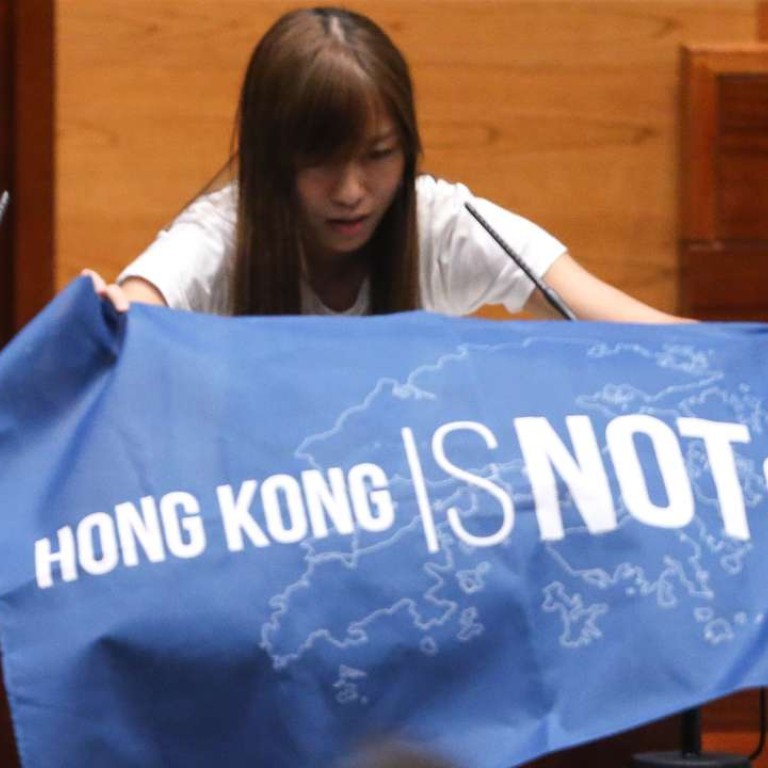
Hong Kong’s ignorant rebel lawmakers don’t understand their duty to the people
Y. S. J. Fung reminds those who mangled their oaths on purpose that they, as public servants, are required to act in the interest of all Hongkongers, including many who do care for the nation
It was a sad day for most Hong Kong people to witness the farcical stunts broadcast live on TV during the solemn swearing-in ceremony for all lawmakers-elect on October 12. When the basic core reality that Hong Kong is a part of China is not acknowledged, it does not matter any more how shamelessly some of the veteran lawmakers, as well as several of the newcomers, played their games.
Legco is not a kindergarten, so let’s leave the temper tantrums and childish posturing aside
It is aggrieving that the two young localists could stoop so low as to refer to China as “Cheena”, a variation of the derogatory term “Shina” the Japanese used while they occupied China during the second world war. It’s obvious that they are ignorant of world history and the history of China and Hong Kong, or have no decency of character.
This is also true of Demosisto lawmaker Nathan Law Kwun-chung, who, while taking his oath, read out to the Legislative Council the famous statement by Mahatma Gandhi: “You can chain me, you can torture me, you can even destroy this body, but you will never imprison my mind.” Again, it is clear that this young man had no idea of the circumstances under which Gandhi said what he did and how and for what he fought all his life: Gandhi’s cause was the Indian independence movement, which sought to create an Indian state free of British rule. He was also committed to a philosophy of peaceful resistance. Who and what gave this young man the misconception that he is in any way near the situation faced by Gandhi?

It’s time for Hong Kong pan-democrats to stand up and condemn localist lawmakers’ offensive behaviour
Perhaps we can’t really blame these young people, who grew up during the tail end of the colonial era and have never experienced the harshness of our colonial masters. Tsang Tak-sing, the former secretary for home affairs, was imprisoned for two years at the formative age of 17 – in the late 1960s – for distributing anti-British pamphlets near his school. What were the now acknowledged leading lights of Hong Kong’s democracy movement, such as Martin Lee Chu-ming, doing then? They did not seem to have any thought of liberating Hong Kong from colonial rule. What have they been teaching their young followers?
We ask and expect of office-holders the highest morals and commitment a person can give
The sudden switch to “democracy” through the introduction of “representative government”, after British prime minister Margaret Thatcher realised that Hong Kong must be returned to China, was a classic example of how the British sowed the seeds of instability. It was government by a few for a few, and when it was forced to leave, the vacuum it left provided fast-food ingredients for a democracy, without allowing time for its gradual development, which inevitably generated havoc and encouraged self-destruction.
By tradition, an oath of office symbolises the special demands we make on public servants, and the responsibilities and privileges that go with the office. It symbolises the trust we place in our office-holders because they, more than other citizens, have pledged to act in the public interest. An oath goes beyond mere legality.

Forget filibustering, it will be guerilla warfare in the new Legco
We ask and expect of office-holders the highest morals and commitment a person can give. In exchange, this person is granted access to significant power in society. However, these vast powers can be used or abused for one’s own interests rather than for the general good. A public functionary must be held accountable for their actions.
There is a need for them to realise and accept that there are very many in Hong Kong who not only love Hong Kong, but also care for their motherland
We expect our public servants to not only act in the interest of the public but also, up to a point, uphold certain values even in their private lives. It is political suicide for these newcomers to continue to behave as street fighters now that they have been voted into the legislature.
While these young adults rudely declared their unwillingness to be related to China in any way, there is a need for them to realise and accept that there are very many more in Hong Kong who not only love Hong Kong and want it to succeed and prosper, but also care for their motherland. It is more than just the feeling of pride that the nation has become the second-largest economy in the world and the home of companies like Alibaba, Tencent and Huawei, which are becoming global brands; it inspires a vision to teach our young, through our own example, to do whatever little we can to help Hong Kong and indeed the whole of China to become stronger on every possible front.
It is time for the localists and the other rebels in the legislature, whose purpose of office seem to be to make Hong Kong ungovernable, to reflect deeply on their behaviour. They should know that to gain the trust and respect of the people of Hong Kong, they have to work for the betterment of the territory, and not its annihilation. After all, as Legco members, their duty is to the whole community, and not just to those who voted for them.
Y. S. J. Fung is a Hong Kong-based author
